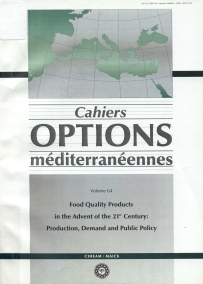| Article précédent | p. 230-243 | Article suivant |
The competitiveness of the Albanian agro-food trade in the framework of trade agreements with the European Community
This paper provides information on Free Trade Agreements negotiated in Albania with other Balkan countries. According to the WTO agreement frameworks, individual countries can agree to lower custom tariffs and other trade barriers, in order to start up and keep service markets open. In this content, Albania is concluding free trade agreements with nine countries of the region, Macedonia, Croatia, Bosnia & Herzegovina, Remania, Bulgaria, Yugoslavia, Moldova, Turkey and Kosovo. This means free exchange of goods and services between these countries by better exploiting their competitive advantages. A big debate is open about these free trade agreements. Some argue that these trade agreements will negatively affect the Albanian products. Some others are concerned about the 'illegal' intrusion of a greater amount of goods, and others say that this is an anti-Albanian policy. However, we see these trade agreements from the stimulant dimension point of view for the Albanian domestic production. Also, there is optimism regarding the wider trade, which involves approximately about 50 million consumers. This may lead to greater possibilities for increasing foreign investments and an increase in the economic stabilization of the region.
- [ Afficher ]
- [ Télécharger ]
- [ Exporter la citation ]
Vous pouvez télécharger la citation au format :
- [ Imprimer ]
-
Mots-clés
ACCORD COMMERCIAL, ALBANIE, BALKANS, CONCURRENCE ECONOMIQUECiter cet article
Qinami I., Civici A. The competitiveness of the Albanian agro-food trade in the framework of trade agreements with the European Community. In : Mattas K. (ed.), Tsakiridou E. (ed.). Food quality products in the advent of the 21st century: production, demand and public policy. Chania : CIHEAM, 2005. p. 230-243. n. 64). 83. EAAE Seminar on Food Quality Products in the Advent of the 21st Century: Production, Demand and Public Policy, 2003/09/04-07, Chania (Greece). http://om.ciheam.org/om/pdf/c64/00800056.pdf



